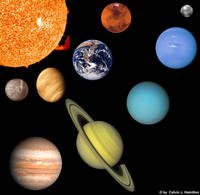 Next week in Prague, a group of astronomers are planning to tell the
International Astronomical Union--the body that decides, officially,
what is or is not a planet--that there are not nine planets, but 12.
Next week in Prague, a group of astronomers are planning to tell the
International Astronomical Union--the body that decides, officially,
what is or is not a planet--that there are not nine planets, but 12.(Read the full story.) Here's what a few Johns Hopkins astronomers had to say about the whole affair (p.s.--dontcha just love nerdspeak?)
Richard Conn Henry, physics and astronomy professor:
"I think the notion that Pluto is a planet is absurd. When it was initially discovered,it was thought to be vastly more massive than it turned out to be. Its orbit is radically different from that of all the other planets. Down with Pluto, is what I say!"
Karl Glazebrook, physics and astronomy professor:
"...if I were in charge, I would insist on a diameter of greater than 1,000 kilometers to define a 'planet' in order to remove Ceres from the list. But that would be an arbitrary cut to preserve the order of the main nine and to save the hassle of rewriting textbooks...Definitions and naming really matter little physically, anyway."
William P. Blair, research professor in the Department of Physics and Astronomy and chief of observatory operations for NASA's Far Ultraviolet Spectroscopic Explorer Satellite:
"This is really not a burning issue for most astronomers. It really is a 'classification' problem more than an issue of science...From what I can tell, they have tried to come up with a consistent definition: an object roughly spherical under its own gravity, orbiting a star, and not orbiting something else. OK, so far. Then they are apparently willing to immediately bend this relatively simple definition and allow Charon to itself be called a planet, with Pluto and Charon being a 'double planet' system. This goes too far and seems inconsistent to me."
Harold A. Weaver Jr., project scientist at Applied Physics Laboratory:
"...we must not forget that any attempts by us to pigeonhole objects in the universe are bound to have shortcomings. The classification schemes that we invent help us to place diverse objects in context, but we must also recognize that nature often doesn't adhere to our attempts to categorize things...In any case, I doubt that the IAU could come up with a resolution that would please everyone."
Andy Cheng, Applied Physics Laboratory:
"...the new definition of planet does not work for me, because 'hydrostatic equilibrium' is an idealization -- it is approximately correct for planets like Earth but is not exact. There is still no criterion for deciding how far from hydrostatic equilibrium an object can be and still qualify as a planet."

No comments:
Post a Comment